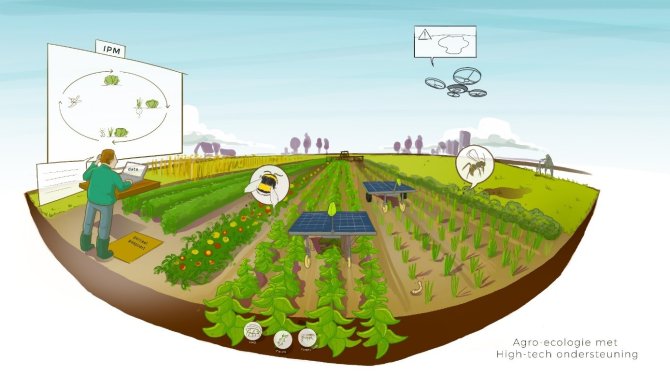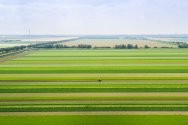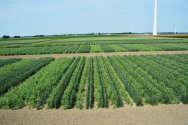Agroecology & Technology Fieldlab
The Agroecology & Technology Fieldlab facilitates multidisciplinary research aimed at developing nature-inclusive and regenerative agricultural systems. On approximately 80 hectares of fertile reclaimed land, we are creating room for experiments and exchanges and laying the foundation for an ecologically and economically sustainable agricultural system.
This fieldlab will become a physical and virtual meeting place where farmers, companies, governments, NGOs and education and research institutes will converge in discussion platforms or other mediums. This will allow us to jointly develop plant production systems that are rich in biodiversity.
New agriculture using smart technologies
The Dutch agriculture and food sector is facing a multifaceted and complex challenge. The pressure on the land and natural resources is increasing, biodiversity is decreasing, climate change is becoming tangible and the market positions and incomes of Dutch farmers are under pressure. The transition to a form of agriculture that can address these challenges is now underway.
Smart technology on land
We are working on a nature-inclusive and regenerative form of agriculture based on ecological processes and smart technologies. A mechanical hoeing and weeding robot was developed for organic agriculture, sensing techniques were created to identify weeds and diseases and autonomous vehicles are being used for site-specific applications.
The fieldlab wants to play a pivotal role in the development and application of agricultural knowledge, principles and smart technology. It also hopes to fulfil an important role in demonstrating, inspiring and encouraging the agriculture sector to develop innovative solutions for nature-inclusive agriculture. Achieving this type of agriculture calls for integrated research, in which all of the building blocks are designed and tested in mutual interdependence in order to create practice-based agricultural systems for the food production of tomorrow.
Future-proof agricultural systems
The physical meeting place is on Elandweg in Lelystad, where integrated research is being carried out on more resilient and future-proof agricultural processes.
Here, multidisciplinary research is being conducted on resilient systems for arable farming and outdoor vegetable cultivation, which is more capable of adapting to changes in the long term (e.g. climate change or decreased biodiversity) and the short term (e.g. heavy rainfall or droughts).
Examples include minimal tillage and organic matter management, green fertilisers, mixed crops, strip tilling, agroforestry, smart agricultural technologies, mechanisation and robotics and systems with minimal dependence on chemical crop protection.
We are researching the agricultural building blocks of both organic and conventional agricultural systems. The biggest challenge is the optimal integration of ecological principles within these agricultural systems. Their management will be more complex for entrepreneurs, which is why we are also developing management tools and decision-making support systems.

We are looking for answers to various questions
The research focuses on answering many questions, such as:
- What are optimal practices for sustainable soil management? What benefits can be achieved from minimal soil cultivation methods (e.g. no-till farming)? What are the differences between supplying organic matter from various green manures, timings for working green manures into the soil and the addition of compost or cut green manure?
- Can the dependence on chemical crop protection agents be decreased by a different construction plan, the use of alternative pesticides, or applying mechanical or cultural practices?
- To what extent does lighter mechanisation lead to less damage to the soil structure and improved soil quality resulting in higher crop yields?
- How can optimal growing conditions be created for the crop? What are the ideal environmental conditions to ensure the disruption of the life cycles of diseases, pests and weeds, and the continuity of useful organisms?
- How does mixed cropping of so-called ‘plant teams’ contribute to soil fertility, productivity of the ‘main’ crop and the suppression of weeds, diseases and pests? To what extent does mixed cropping offer opportunities for improving biodiversity both underground and above ground?
- What are the possibilities of agroforestry (the combination of annual and perennial woody crops) and what does this contribute to production, biodiversity, soil fertility, incidence of disease and landscape quality? What does such a system design look like?
- Are these practices / cultivation systems economically attractive for the farmers?
Interested in contributing your ideas?
The researchers from the Agroecology & Technology Fieldlab invite you to cooperate and enter the dialogue with other stakeholders about ecological and economically-sustainable plant-based production systems. We are developing a discussion platform for this which will be online soon.
The Fieldlab wants to expand the experiments, but also hold the discussion about future-proof agriculture that uses agroecological principles and smart technology. The solutions are not ready-made, and can only be found through collaboration between farmers, the business community, chain parties, governments, NGOs and knowledge institutes.
Contact us!
The Agroecology & Technology Fieldlab is the perfect place for conducting agroecological research, for seeking inspiration on regenerative agriculture and for entering into a dialogue about the agriculture of the future.
The Fieldlab is also intended as a meeting place. You can make an appointment to meet the researchers and receive on-site explanations about ongoing studies.
Would you like to know more about the research and collaboration options?
Visiting address
Agroecology & Technology Fieldlab
Elandweg 84
Lelystad



